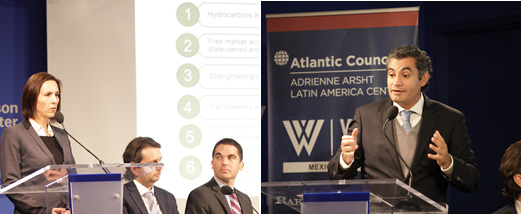 Following the passage of secondary legislation in August 2014, Mexico’s energy industry is set for profound transformation. As leaders across the public and private sectors face a new era in the country’s energy matrix, policymakers across the region are looking to the Mexican experience as an example for both energy reform and an opportunity for integration throughout the region.
Following the passage of secondary legislation in August 2014, Mexico’s energy industry is set for profound transformation. As leaders across the public and private sectors face a new era in the country’s energy matrix, policymakers across the region are looking to the Mexican experience as an example for both energy reform and an opportunity for integration throughout the region.
On November 14, 2014, the Adrienne Arsht Latin America Center hosted Mexico’s Undersecretary of Hydrocarbons María de Lourdes Melgar Palacios and the Director General of Mexico’s Federal Commission of Electricity (CFE), Enrique Ochoa Reza, for a public discussion at the Wilson Center. The event was held in partnership with the Woodrow Wilson Center’s Mexico Institute, Baker and McKenzie LLP, the US Chamber of Commerce, and Platts. David Goldwyn, the Latin America Center’s senior nonresident energy fellow, joined the discussion with Dr. Melgar and Dr. Ochoa, and Bill Loveless, host of Platts Energy Week, moderated the panel.
After opening remarks from Jason Marczak, deputy director of the Adrienne Arsht Latin America Center, and Duncan Wood, director of the Wilson Center’s Mexico Institute, Dr. Melgar highlighted the key implications of the reform for the oil and gas industry. She outlined the new institutional framework inherent to the laws’ enforcement that aims to encourage transparency and accountability. These protracted efforts, according to Melgar, will empower Mexico to become an energy hub, fulfilling domestic demand and rising to international prominence in the energy sector.
In his address in front of the packed auditorium, Dr. Ochoa examined the reform process from the CFE perspective, noting that the new legislation has the potential to clear the power generation hurdles facing Mexico. His country’s electricity rate is 25 percent than that of the United States largely due to the use expensive oil fuels. Mexico’s energy reform will help improve the pipeline infrastructure to transition power plant generation to natural gas and reorganize the natural gas market with the help of the Natural Gas Control Center (CENAGAS).
During the panel discussion, Goldwyn observed that the thrust of Mexico’s energy reform is intended to boost the economy. Watch who invests in Mexico and its energy industry, he went on, to measure the success of the enacting legislation. Both Goldwyn and Ochoa noted the significant potential for natural gas pipeline infrastructure development to spur growth in all regions of Mexico.
Following a question-and-answer session with audience members, Benjamín Torres-Barrón, partner at Baker & McKenzie LLP in Mexico, discussed the legal mechanisms of the reforms that provide the incentives for the energy industry to expand. He reiterated the panelists’ view that the new energy laws will translate into gains across all sectors of the economy.
This event followed two publications in step with the reform process and written by the Adrienne Arsht Latin America Center’s nonresident senior energy fellow, David Goldwyn, Mexico’s Energy Reform: Ready to Launch (August 2014; co-written with Neil Brown and Megan Reilly Cayten) and Mexico Rising: Comprehensive Energy Reform at Last? (December 2013).
